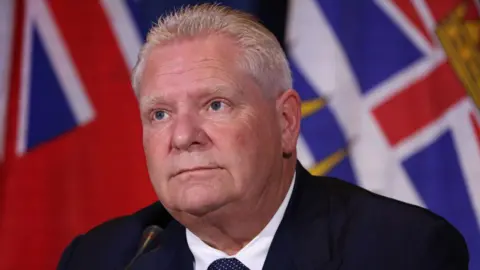Nadine YousifSenior reporter from Canada, Toronto
 Getty Images
Getty ImagesOntario Premier Doug Ford said he will suspend his province's anti-tariff advertising campaign in the U.S. after it prompted President Donald Trump to end trade talks.
Ford, one of Canada's most vocal critics of U.S. tariffs on Canadian goods, said he made the decision after speaking with Prime Minister Mark Carney on Friday, adding that the television spot would be paused on Monday “so trade negotiations can resume.”
It will still air weekends on U.S. networks, including during Major League Baseball World Series games, he said.
Earlier on Friday, Carney told reporters that Canada is ready to resume trade negotiations with the United States “when the Americans are ready.”
Late Thursday, Trump criticized the ad in a Truth Social post, calling it “fake” and “egregious.” He said the trade negotiations are “HEREWITH TERMINATED.”
The ad, sponsored by the Ontario government, quotes former U.S. President Ronald Reagan, a Republican and icon of American conservatism, as saying the tariffs “hurt every American.”
The video is excerpted from a 1987 national radio address on foreign trade.
Trump's halt to trade talks came after the Ronald Reagan Foundation, which is tasked with preserving Reagan's legacy, released a statement saying the ad used “selected” audio and video of the former president's remarks.
He accused the ad of misrepresenting Reagan's address and said the Ontario government did not seek permission to use it.
Ford said Friday that the ad's goal was to “start a conversation about the kind of economy Americans want to build” and the impact of tariffs.
“We achieved our goal of reaching American audiences at the highest level,” he said.
Trump's response to the ad sparked debate in Canada over whether Ford's combative approach to trade negotiations with the United States was correct, or whether the country would have been better off finding a friendlier response to its neighbor and closest trading ally.
Canada remains the only G7 country that has not reached a trade deal with the US since Trump began imposing sweeping tariffs.
The US has imposed a 35 per cent levy on all Canadian goods, although most are exempt under the current free trade agreement. It also imposed industry levies on Canadian goods, including a 50 per cent levy on metals and a 25 per cent levy on cars.
These industry tariffs have particularly hurt Ontario, where the bulk of Canada's auto industry is based.
Carney has been trying for months to negotiate an agreement that would ease the tariffs. Three-quarters of Canada's exports are sold to the United States, making its economy particularly vulnerable.
However, he preferred friendly personal meetings and text messages with the US President.
Ford, on the other hand, took a more defiant stance. He pulled American spirits from Ontario shelves and briefly threatened to halt energy exports.
He told reporters last week he was “tired of sitting and turning around” after car maker Stellantis announced it would move some production from its Brampton, Ont., plant to the United States.
“We need to fight back,” Ford said at the time.
The next day, he launched an advertising campaign that ultimately drew the ire of the US President.
“Theatricality and Hyperbole”
Trump's abrupt end to trade talks was not a surprise to most Canadians, said Mahmoud Nanji, a research fellow at Western University's Ivey Business School and former deputy deputy minister of finance for Ontario.
The US president made a similar threat earlier this year after Ottawa announced it would impose a digital services tax on US tech companies.
“His posts tend to be full of theatrics and exaggeration,” Mr. Nanji said.
And while some may appreciate Ford championing the interests of Ontario industries most affected by the tariffs, the timing and tone of Ford's ad campaign did not help the situation in Canada, causing “an unnecessary distraction,” Mr. Nanji added.
It's unclear whether trade talks will actually resume now that Ford has pulled the ad and Trump has yet to respond to the announcement that it will be stopped.
On Friday, the White House expressed disappointment over what it called Canada's “long-standing unfair trade barriers,” adding that efforts to address those issues have “failed to make any meaningful progress.”
Carney made some appeasements to keep negotiations going, including eliminating retaliatory tariffs and cutting Canada's digital services tax. But he has repeatedly said he is looking for “the best deal for Canada.”
Both Trump and Carney head to Asia on Friday for the ASEAN summit in Kuala Lumpur. The Canadian Prime Minister told reporters that the purpose of his trip would be “to develop new partnerships and opportunities, including with the economic giants of Asia.”
But Carney also left the door open for trade negotiations with the United States to continue.
Mr. Nanji said the advertising saga was a reminder that the path to an agreement for Canada will not be easy, regardless of the negotiating methods.
He noted Carney's remarks earlier this week in which he said “the United States has fundamentally changed its approach to trade” and that Canada's close ties to the United States have become a weak point.
“We have to take care of ourselves because we can't rely on one foreign partner,” Carney said in a speech Wednesday announcing his government's first budget, which will be released Nov. 4.
The speech, Mr. Nanji said, was also meant to “warn Canadians that the road ahead is really going to be tough with the Americans.”








